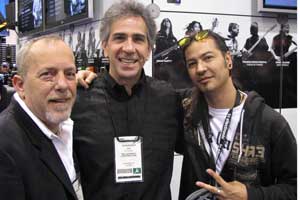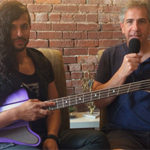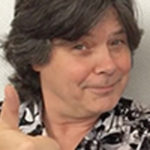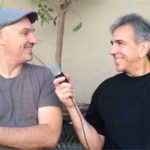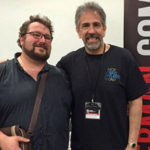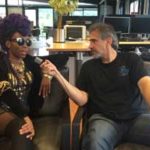Hard-core blues fiend recounts his invaluable education from Johnny B. Gayden and Albert Collins, plus the “Low Notes for Nashville” story and much more!
Exclusive interview with FBPO’s Jon Liebman
Photo, L-R: Lane Baldwin, Jon Liebman, Uriah Duffy
April 23, 2012
Lane Baldwin is a freelance bassist, bandleader, producer, arranger, musical director, songwriter, clinician and author. He is a former student of studio legend Carole Kaye and a twenty-plus-year protégé of iconic blues bassist Johnny B. Gayden of Albert Collins fame, who describes Lane as “one of the best bassists on the scene today.”
Baldwin has served as a Musical Ambassador for Washington, DC, as a member of a select group of artists chosen to represent the US on various European tours and at cultural events. He is also a co-founder of “Low Notes for Nashville,” an international group of top artists formed to provide relief to musicians devastated by the May 2010 floods in Tennessee.
Throughout a career that has spanned nearly thirty years, Lane has done extensive performing and touring, both as a solo artist and sideman, throughout the US and abroad. He performs with the band Deeper Blues, whose debut CD, Dig the Hole, was released in 2008.
FBPO: Tell me about your musical upbringing.
LB: I started on piano at age 5, studying under the same woman who taught my mother in her youth and brought my sister to a very advanced level in just a year and-a-half. She taught us a lot of theory and ear training as well, which helped me later when I began to play bass.
The piano lessons stopped when we moved from Texas to Virginia, but I soon got a half-size acoustic guitar and learned a few chords. It just didn’t really seem to fit, however. Then, in about fifth grade, I took up euphonium, or baritone horn. I dabbled in drums – another non-fit – in seventh grade, then discovered the bass during the summer between 7th and 8th grades.
FBPO: How did you discover the bass?
LB: I went to the local music store one afternoon and saw this cheapo Asian bass on the wall. The owner took it down and plugged it into what he swore was a bass amp. It was an Ampeg Gemini, which I learned much later was a guitar amp. When I thumped out a few low notes, it just hit me that the bass and I were made for each other.
I could see in my mind the relationship between the bass and every other part of the band – a wheel, in which the bass was the hub and the other parts were the spokes. I saw how the bass would tie rhythm to harmonic structure and how the bass player could determine the feel and sound of the song purely by his note choices and how he interacted with the other parts. Right then and there, I was a goner. I had to play bass!
From there it was a process of learning the instrument, mostly through playing in young local bands, just like everyone else. When I joined the Navy, I continued to play. My second time back in Monterey, California, I got to study with Carol Kaye for several months. Shortly after that, I left the Navy and came back to the Northern Virginia area, since my family was still there. Within months, I was divorced and decided to double down on the whole “traumatic change” thing by becoming a professional musician.
FBPO: It’s hard to imagine anyone describing you without mentioning “the blues” pretty early in that description. What is it about the blues?
LB: The emotion of it, as it was meant in the beginning. But that’s starting in the middle. Initially, I thought I was going to be a rock guy and I actually was for a while. Later in my career, I did a ton of recording for local metal bands, although not much stage work. Yep, you guessed it – age! No big deal. I made a ton of money on the recording sessions.
I worked with several good original rock bands in the DC area. I also toured for a year and-a-half with a country outfit. It was after that run that I joined an original “power pop” band that later hired an up-and-coming local blues guitarist, Linwood Taylor. It was Linwood who opened up the entire world of the blues to me.
Up until then, 95% of the blues I’d heard was filtered through the likes of Led Zeppelin and Jimi Hendrix. Linwood turned me on to the real deal, thanks to a multi-generational collection of original recordings. One of Linwood’s closest friends at the time was the late amp guru, César Díaz. Those two introduced me to pretty much everyone in the Mid-Atlantic blues scene and began my education.
FBPO: How would you describe that education?
LB: Well, less than two months later, I met Johnny B. Gayden. It was jam night at the Gentry and the Icebreakers showed up to play. Rob, the second guitarist behind Albert, stepped up front and a local player took second spot to fill out the band. Albert sat and watched – held court, more like.
Well, they tore the roof off the place and left if burning in the street, so of course no one wanted to follow them. I was forced to take the bass chair. Linwood sort of felt sorry for me, so he grabbed a good drummer and we did a trio set. Not a problem, even with Johnny B. and Albert sitting at the table right in front of me. Until Linwood throws me a solo in the third tune. Sheer terror, man! Just total dread. But I got through it and did well enough that Johnny told Linwood to invite me to the after-party at the hotel. Johnny spent the next four hours with me, each of us playing the other’s bass. He gave me a master class while the party went on around us.
After that, we’d always get together when he came through town with the band. And it was those ongoing visits with Johnny, and sometimes Albert, that taught me the real purpose of the blues. A lot of other great people told me the same things – and more – over the years. But it was Johnny and Albert who taught me what it meant to really play and sing the blues.
FBPO: You mean the emotional part?
LB: That’s exactly what I mean! You see, the blues was a means of dealing with intense, brutal pain, of feeling it, wrestling with it and really getting it out in the open. And in doing that, the person could let some of that pain go and find some renewal so they could just face another day. And singing that pain out is a whole lot better than burying it down inside where it can kill you in any number of ways – health problems, substance abuse, violence, whatever. It’s so much better to put the pain into a song and let it go. And the cool thing is, even if you’re a passive listener, not even joining in on the shout outs and call-backs, you can still take part in the magic of the moment. If you can identify with the pain, you can feel your own along with the singer and you can let it go.
So [smiling], you can see I’m sort of passionate about it all, right? But that’s why I named the project Deeper Blues, with a tag line that says, “Blues the way it was meant to be felt!”
FBPO: One of the things you’re known for is your understated quality of laying down the groove. I’ve always felt it takes more discipline to play those unembellished blues grooves over and over with little or no variation. Would you agree?
LB: Yes, I would. There’s definitely a discipline to playing serious “mud-in-your-toes” blues. Now, just as has happened with guitar, some of the newer players are more “chops” oriented, do a lot of slap and such. But to me, there’s nothing like a bass player and a drummer laying it down straight and solid, just like a freight train rolling down the track. Unstoppable, man. That’s what that is. Unstoppable. And the guitar player is riffing just enough to tell you what’s going on without being too busy about it. And all of this is going on under the story. The whole reason for the song is the story, not the chops, and the listener gets drawn in. They can’t help it. The groove just gets so insistent that you have to move something, whether it’s your foot, your head, your fanny in the chair or your whole body on the dance floor.
You find your groove and you just beat it like it owes you money. Then you find the spots where you just have to do something a little different to set up the perfect tension and release going to the next section of the song, whatever it may be. And you ask yourself, “Which notes are absolutely critical here?” And you play only those notes and no more. And, bam! You slam back into the groove for that next section and everything kicks up a notch, or pulls back, or the floor drops out and you can hear the echoes ringing out for a second before you hear the band again, playing as low as low can be. And there you are, still laying down that tasty groove.
FBPO: What do you try to get across in your workshops and clinics? Any special “Lane-isms” you’d care to share?
LB: Several, but I’ll do my best to hit the main ones:
- Learn the basics. All of them. Sure, you want to start learning songs right away, but even as you are learning new songs, you should be learning new scales, new exercises for really learning your scales and your entire fretboard, new riffs, new theory. Never stop learning the basics. They’re the building blocks of your abilities.
- Start learning songs right away. You should learn a few thousand of them over your career because every one of them can teach you something new, something you can incorporate into your own style.
- Play for the song, not for your ego. You know, I sit down with a bass in a music store and everyone wants to hear a billion notes. When I don’t start into that, I often see smirks and looks as if to say, “This guy can’t play.” But let me break into the solo version of “Time of My Dyin’” and that all stops. Because even though it’s not all that much in a technical sense, there’s a power to that song when the band serves the song instead of ego. Play it straight. Play it simple and elegant. And let the story do the talking. It’s the same in every kind of music. If you concentrate on serving the song, filling your role as the foundation of it all and working to make the song and everyone else in the band sound as cool as possible, then I’ll call you a real bass player.
- Learn to really lock with your drummer, no matter his feel or style. Every drummer has a different style, just as your style should be different from everyone else’s who plays bass. Don’t change them, except to help them be better. Learn to work with them. Learn to mesh your style with theirs to create a rhythm section that sounds like no other.
FBPO: What kind of equipment are you using these days?
LB: I’m still using Spector basses. I’m honored to have endorsed them for more than sixteen years and I’ll play them until I die. I love them that much. My main bass is still my NS-6XL, “The Voice.” It’s the first translucent black finish they ever did, the first with all black hardware and the only 6-string ever built with the fiber optic neck marker system they only put into about ten basses. I now also have a pair of Codas: Eddie, a 4-string, and Etta, a 5-string. I string them with DR Strings “Black Beauties.” I’ve used them for fifteen years and have endorsed them for about half of that. I love them!
After years of using nothing, I now have a pedal board that includes a Line 6 G50 wireless system, a Sans Amp programmable preamp/DI, EH mini POG octave box (going up an octave, not down), a Peterson Stomp Classic tuner – I’ve endorsed them for about 4 years now – an Ernie Ball volume pedal and a XX compressor/limiter. I also have an Avalon U5 DI for recording.
A lot of the time I just go direct into house sound and use the monitor to hear myself. But if I do use an amp onstage, I’ve been using an Eden WT-550 to power one – sometimes two – DNS-112N speakers from David Nordschow Amplification (DNA Amps). Of course, I’ve known David for almost twenty years and was proud to endorse Eden for most of that time. When he left Eden to launch his new company, I went with him and helped him in the start-up phase.
I also have a Renaissance RS-6 Deuce acoustic/electric guitar that I love. I use that for songwriting, but have also performed with it for the past few years. Not that I’ve given up bass – far from it. But playing the guitar has been an interesting part of learning to play “lead bass guitar.” Not solo bass, a la Roy Vogt or Victor Wooten, more like a blues guitarist, only an octave lower. I string that with DR Zebras.
All my instruments are supported by LM Products straps. That’s another company I’m very proud to endorse. They do outstanding work.
FBPO: Tell me about “Low Notes for Nashville.” What a beautiful example of people getting together to help other people!
LB: Boy, wasn’t it, though? I’m so grateful to have been a part of that. It all started a few days after the flood in May 2010. One of my closest friends, Sean O’Bryan Smith – a phenomenal bass player and solo artist – was overwhelmed by the damage the city suffered, even though he escaped mostly unharmed. But like a lot of my Nashville friends, he looked around and wondered what he could do in the face of all of that and he decided to start small and see if he could set an example for others.
So Sean puts up a tweet that he’s going to donate his profits from download sales to the flood relief effort. As soon as I saw that, I replied that I would do it, too. Then I called him. Turned out he was timing me! We laughed about how long it took for me to call. We talked about the download thing then he said he wanted to do more. I asked what he meant. He said, “I want to see how many people we can get involved.”
“OK,” I answered. “Let’s make a list.”
By the end of the day, my close friend and now business partner, Roger Barlow – another bassist, by the way – had set up a website with a blog and we had gotten Mick Donner and Dave Pomeroy in on the idea. Of course, David was already neck-deep in everything in his role as president of the musicians’ union down there. And Mick! He knows everybody! By the end of it, we had dozens of top bassists supporting the cause, doing videos, making donations. We also had help from dozens of great companies sending all sorts of gear for the victims. And we had donations from several thousand people.
The icing on the cake was the concert we produced the night before that summer’s NAMM show. What a great bill! I was so honored to emcee the show and to play a tune. Of course, Sean played, as did Roy Vogt, Mahlon Hawk, Vail Johnson, Bryan Beller and his wife Kira Small, Steve Lawson, Adam Nitti, Dave Pomeroy and Doug Johns. The highlight of the night was to see headliner Steve Bailey onstage with his friends Victor Wooten and Jonas Helborg.
All told, we raised more than $50,000 for flood relief. And we helped the bass community see the power of working together. It was all just so wonderful.
FBPO: You must be pretty excited about Dig the Hole, particularly with all the positive response it’s received.
LB: I’m thrilled with the response it’s received. Even four years later, I still get steady sales and downloads. And a lot of questions about when the next one is coming out.
FBPO: Well…?
LB: I’m in pre-production now for the follow-up CD. I’m working with a very close friend and we’re going to take the project to another level in several ways. First, we’re going to use the bass as a solo instrument more, doing that whole “blues guitarist down low” thing. We’re also building on the first CD, but adding another dimension to the sound. I’m really excited about it all.
FBPO: What else is keeping you busy?
LB: I’m working a lot lately on my bass lessons site. I have a couple of other websites, too, one about quitting smoking and another devoted to cooking. Cooking is very fun and therapeutic for me. The site is a result of fan requests for my recipes and it just grew from there.
Currently, I’m in California, near San Jose. I’ve been staying with Roger and his family while we work on some sites together. If all goes as planned, I’ll have a place of my own soon and a wonderful year ahead of me.
FBPO: What’s next? What else would you like to do that you haven’t accomplished yet?
LB: Next is the CD, then the one after that, and the one after that… My plan is to do a CD every year, then tour behind each one. I have more than a hundred songs yet to record and I’m still writing. I want to commit as much music to disc as I can before I leave this world.
FBPO: What would you be if you weren’t a bass player?
LB: Actually, I sort of like that life already. I have a parallel career in writing, training and speaking on a management philosophy called servant leadership. I’ve had one essay published in a leading anthology series and another one due out early next year. I’m now working with the world’s foremost authority on the subject, Larry Spears, on a full-length book project.
My absolute dream would be to weave servant-leadership appearances with the band tour schedule, as well as bass clinics and appearances at schools to encourage the study of music. I know it seems strange at first glance, but service is the whole point of the role of a bassist in a band. We serve the music. We serve the other musicians. And we do it because we know that in doing so, we all sound better. It’s not all that different than the philosophy that drives my business. Whether you’re talking about my music career or the business work I do, my motto is: Servant first, servant always.
